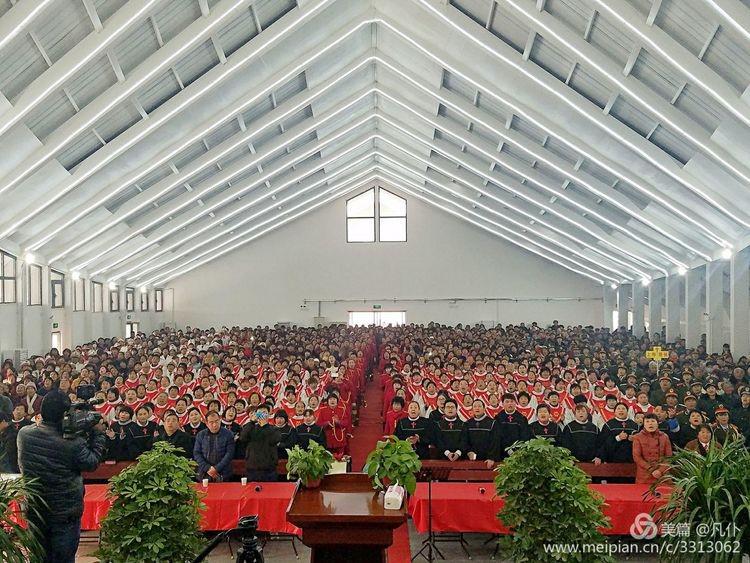Nearly forty years after China's opening-up policy, the country has seen rapid development in its churches. The number of believers reached its peak since Protestantism entered China 200 years ago. Many pastors and believers are very optimistic about Chinese churches' revival, thinking the country is going to be a missionary's kingdom.
However, other pastors and scholars point out that the development of Chinese churches has reached its ceiling with signs of slowing down in growth in recent years. It may not be easy to recreate the strong momentum as in the beginning of the opening-up.
I spoke with a social scholar on this a while ago. We both believe that whether Christianity in China has reached its ceiling or not needs more research and quantifying. It is too early to draw any conclusion yet.
What's sure is that some problems facing Chinese churches can have a negative influence in the future. This requires deep thought from our pastors.
Society stabilizes, need for the Gospel decreases.
Chinese society underwent great transitions in the 20 years after the opening-up policy which shook the country in social, economic, and cultural areas. Many people found that time too difficult to cope with, so they felt lost about the future.
On the other hand, Chinese people urgently needed to find a spiritual shelter as they had just walked out of the Cultural Revolution's shadow.
In this way, Christianity became many people's choice. For example, "believers in North-east China grew fastest in the 90s" is linked to the lay-off wave at the time. However, Chinese society is more stable in this century, people have more opportunities, and living quality has gradually improved. With such a background, people are less anxious, so they're less interested in faith. Therefore, there are fewer people willing to hear about the Gospel.
Ways of recreation are no longer limited.
In the beginning of China's opening-up, people had very limited opportunities for amusement. At the time, people chose to join the church not because of faith, but for socializing, such as meeting new friends at the church, participating in the choir and Christmas Eve celebration to satisfy personal needs.
As China is more opened, there are more and more options relating to recreation. Needless to say if the church is still attractive to non-believers, even believers find themselves unable to resist the social recreation and follow the atmosphere of "amusement to death." These believers become more and more indifferent spiritually. We have to consider the impact of recreation in the church's development, which needs the wisdom of church leaders.
Religious environment changed.
Many scholars on Christianity point out that the tremendous development Christians received after the opening-up has a lot to do with the imbalance of the religious environment.
One after another violent campaigns since 1949 severely hurt Confucianism, Buddhism and Taoism in China, as well as other folk religions, causing them to decline. So after the implementation of religious freedom, Christianity shifted from being marginalized to the same circumstances as others. They all needed to start over.
With many pastors and believers actively spreading the Gospel, many new believers converted.
What's more, at the time folk religions were still suppressed as superstitions, which also provided convenience for the development of the church.
However, since 2000, the religious environment has changed. On one hand, other religions are able to grow and took over a greater "share" in the "religious market." On the other hand, folk religions are more and more recognized as a cultural inheritance and have gained protection and development. Christianity has lost its old favorable timing and is facing great challenges from other religions and folk religions.
Message is not appealing.
I was told by a social scholar that despite his favorable impression toward Christianity, it is TORTURING to sit through a sermon. In fact, many others share the same opinion, including believers. They all believe that many preachers are not qualified. They either speak in tongues, or share shallow and boring messages that make people sleepy.
Due to the particularity in the early 80s, the general educational level was low, so it was acceptable to preach miracles or Bible verses. However most Chinese born in the 80s and 90s have received higher education and they find it hard to accept these clichés.
Therefore, preachers need to keep learning knowledge in addition to theology, focus in current news, and improve their preaching skills. Only in this way will they bring more people to God.
Means to know the western world changed.
In order to quickly get rid of the backwardness, China learned from the west in the early 80s. As a carrier of western culture, Christianity became the platform for many people to learn about the west and see the world.
In urban churches, a lot of people learned English, met foreigners, and mastered western knowledge. Many of them were baptized into Christ because of this.
However, with the tremendous achievement, the interaction between China and the rest of the world is closer than ever. Especially with the powerful internet, people have more means for learning about the west and the church's role as a platform is weakening.
As sinology becomes more popular, some people no longer recognize the western culture's advantage. The pursuit of such culture is also cooling down. There have also been boycotts against some holidays, like Christmas.
Therefore, Chinese churches need to strengthen "Sinicization of Christianity."
Christians lack testimony.
In the eyes of some non-believers, Christians are extreme in actions and words, odd, hypocritical, and ungrateful to ancestors.
-Translated by Grace Hubl








